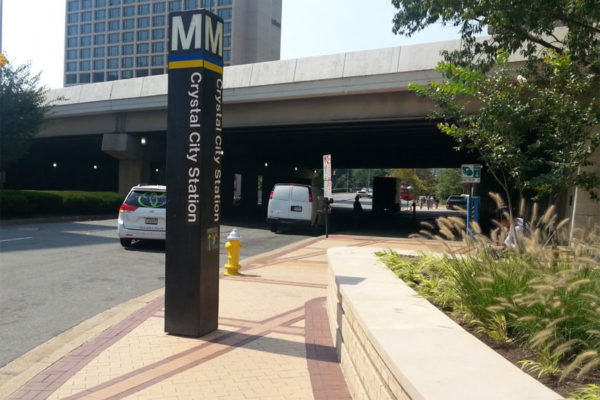Funding to help WMATA keep running and catch up on maintenance may end up jeopardizing major projects slated for two busy Arlington Metro stations.
A new deal brokered by state lawmakers will send about $154 million to Metro each year, providing funding for badly needed improvements to the system — but Arlington officials fear the structure of the agreement could imperil planned Metro entrance projects.
For years, the county has been hoping to add second entrances to the Ballston and Crystal City stations to make it easier for people in those neighborhoods to access the Metro. But Arlington planned to pay for those projects with the help of a regional group that doles out money for transportation improvements: the Northern Virginia Transportation Authority, commonly known as the NVTA.
Yet the NVTA can only afford to fund that kind of construction effort with the tax revenue it brings in, and the dedicated funding deal hashed out in Richmond will divert a substantial chunk of that money to Metro for ongoing operations and maintenance.
Gov. Ralph Northam and his fellow Democrats had hoped to avoid that outcome by bumping up a few Northern Virginia tax rates instead, but the slim Republican majority in the House of Delegates scuttled that plan in favor of sending the NVTA money to Metro.
NVTA leaders aren’t yet sure just how much money the group will lose — they’re currently projecting a roughly $80 million drop in annual revenue for the next six years — but they are reluctantly admitting that the group will have to trim the list of projects it can fund in the coming years.
Arlington County Board Chair and NVTA board member Katie Cristol expects that will prompt indefinite delays of the projects at Ballston and Crystal City, or it could force the county to find new funding streams for them entirely, an unwelcome prospect given Arlington’s increasingly stretched finances.
“When there’s less money to go around, it forces a re-racking of priorities,” Cristol told ARLnow. “These would be transformational projects for us, but the need is different elsewhere.”
NVTA chairman Marty Nohe, a Republican who also serves as vice chair of Prince William’s Board of County Supervisors, says his group largely focuses on funding projects that relieve traffic congestion around the area. While he fully expects that adding second entrances at those Arlington stations would pull some cars off the road, he also notes that they likely won’t have the same impact as other road improvements elsewhere in Northern Virginia.
“That’s the nature of these multimodal projects,” Nohe said. “It doesn’t put more trains on the track, it makes it easier for people to get there and opens the station up to a larger segment of the Arlington population… so it’s a good example of the type of project that will absolutely be affected by a loss of NVTA funds due to the Metro bill.”
Del. Tim Hugo (R-40), a leading opponent of tax increases associated with the Metro funding bill, has frequently dismissed Nohe’s concerns as overblown. He’s often noted that Metro is already cancelling some of its own requests for NVTA funding with the state deal secured, which could very well free up more money for localities like Arlington and lessen the need for such a drastic reordering of funding priorities.
But Cristol and Nohe are both taking the prospect of the deal delaying the Ballston and Crystal City improvements seriously. Cristol is concerned that further delays for the second entrance at Crystal City will have ripple effects on the nearby Virginia Railway Express station — without another Metro entrance closer to the VRE station, she fears the county might not be able to effectively encourage commuters to transfer between the two transit systems.
“We’re trying to create this nexus with VRE there,” Cristol said. “But if people have to do a bunch of walking and cross the street to transfer, they might be inclined to just get in their car and drive.”
State Sen. Barbara Favola (D-31) points out the county could apply for “Smart Scale” funding to pay for the projects, putting Arlington in competition with localities around the state hoping for transportation dollars. That could mean less money is available for other, smaller municipalities, and Favola predicts that could prompt more action on the issue in Richmond next year.
“Every Northern Virginia lawmaker, particularly on the local level, they’re concerned,” Favola said. “I really think we’re going to have to go back and revisit this.”
Photo via Arlington County


